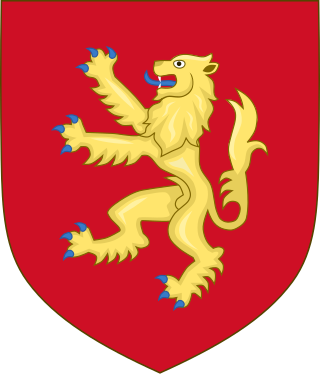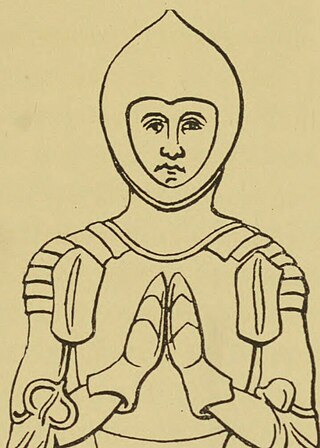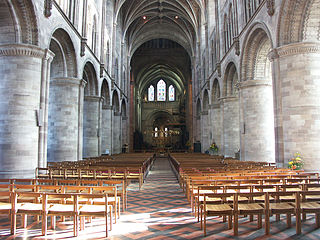Related Research Articles

Rupert of the Palatinate, sometimes known as Robert of the Palatinate, a member of the House of Wittelsbach, was Elector Palatine from 1398 and King of Germany from 1400 until his death.

Year 1327 (MCCCXXVII) was a common year starting on Thursday of the Julian calendar.

Anne of Bohemia, also known as Anne of Luxembourg, was Queen of England as the first wife of King Richard II. A member of the House of Luxembourg, she was the eldest daughter of Charles IV, Holy Roman Emperor and King of Bohemia, and Elizabeth of Pomerania. Her death at the age of 28 was believed to have been caused by plague.

Thomas of Woodstock, Duke of Gloucester was the fifth surviving son and youngest child of King Edward III of England and Philippa of Hainault.
John Holland, 1st Duke of Exeter, 1st Earl of Huntingdon, KG, of Dartington Hall in Devon, was a half-brother of King Richard II (1377–1399), to whom he remained strongly loyal. He is primarily remembered for being suspected of assisting in the downfall of King Richard's uncle Thomas of Woodstock, 1st Duke of Gloucester (1355–1397) and then for conspiring against King Richard's first cousin and eventual deposer, Henry Bolingbroke, later King Henry IV (1399–1413).

Thomas Holland, 1st Duke of Surrey, 3rd Earl of Kent, KG, Earl Marshal was an English nobleman and courtier.

Richard Fitzalan, 4th Earl of Arundel, 9th Earl of Surrey, KG was an English medieval nobleman and military commander.
The title of Earl of Gloucester was created several times in the Peerage of England. A fictional earl is also a character in William Shakespeare's play King Lear.

Thomas Chaucer was an English courtier and politician. The son of the poet Geoffrey Chaucer and his wife Philippa Roet, Thomas was linked socially and by family to senior members of the English nobility, though he was himself a commoner. Elected fifteen times to the Parliament of England, he was Speaker of the House of Commons for five parliaments in the early 15th century.

Thomas Despenser, 2nd Baron Despenser, 1st Earl of Gloucester KG was the son of Edward le Despenser, 1st Baron le Despencer, whom he succeeded in 1375.

The Epiphany Rising was a failed rebellion against King Henry IV of England in early January 1400.

Eleanor Cobham was an English noblewoman, first the mistress and then the second wife of Humphrey, Duke of Gloucester, who in 1441 was forcibly divorced and sentenced to life imprisonment for treasonable necromancy, a punishment likely to have been politically motivated.

Gilbert Foliot was a medieval English monk and prelate, successively Abbot of Gloucester, Bishop of Hereford and Bishop of London. Born to an ecclesiastical family, he became a monk at Cluny Abbey in France at about the age of twenty. After holding two posts as prior in the Cluniac order he was appointed Abbot of Gloucester Abbey in 1139, a promotion influenced by his kinsman Miles of Gloucester. During his tenure as abbot he acquired additional land for the abbey, and may have helped to fabricate some charters—legal deeds attesting property ownership—to gain advantage in a dispute with the Archbishops of York. Although Foliot recognised Stephen as the King of England, he may have also sympathised with the Empress Matilda's claim to the throne. He joined Matilda's supporters after her forces captured Stephen, and continued to write letters in support of Matilda even after Stephen's release.

Gloucester College, Oxford, was a Benedictine institution of the University of Oxford in Oxford, England, from the late 13th century until the dissolution of the monasteries in the 16th century. It was never a typical college of the University, in that there was an internal division in the college, by staircase units, into parts where the monasteries sending monks had effective authority. The overall head was a Prior.

The Lordship of Glamorgan was one of the most powerful and wealthy of the Welsh Marcher Lordships. The seat was Cardiff Castle. It was established by the conquest of Glamorgan from its native Welsh ruler, by the Anglo-Norman nobleman Robert FitzHamon, feudal baron of Gloucester, and his legendary followers the Twelve Knights of Glamorgan. The Anglo-Norman Lord of Glamorgan, like all Marcher lords, ruled his lands directly by his own law: thus he could, amongst other things, declare war, raise taxes, establish courts and markets and build castles as he wished, without reference to the Crown. These privileges were only lost under the Laws in Wales Acts 1535–1542. Though possessing many castles, the main seat of the Lordship was Cardiff Castle.

Henry le Despenser was an English nobleman and Bishop of Norwich whose reputation as the 'Fighting Bishop' was gained for his part in suppressing the Peasants' Revolt in East Anglia and in defeating the peasants at the Battle of North Walsham in the summer of 1381.
Thomas Pope (1507–1559) was founder of Trinity College, Oxford.
Sir Walter Beauchamp was an English lawyer who was Speaker of the House of Commons of England between March and May 1416.

John Montagu, 3rd Earl of Salisbury and 5th and 2nd Baron Montagu, KG was an English nobleman, one of the few who remained loyal to Richard II after Henry IV became king.

Sir Thomas Clanvowe was a British landowner, Member of Parliament and Sheriff of Herefordshire.
References
- ↑ http://www.historyofparliamentonline.org/volume/1386-1421/member/pope-thomas-1400. Archived 17 October 2013 at the Wayback Machine